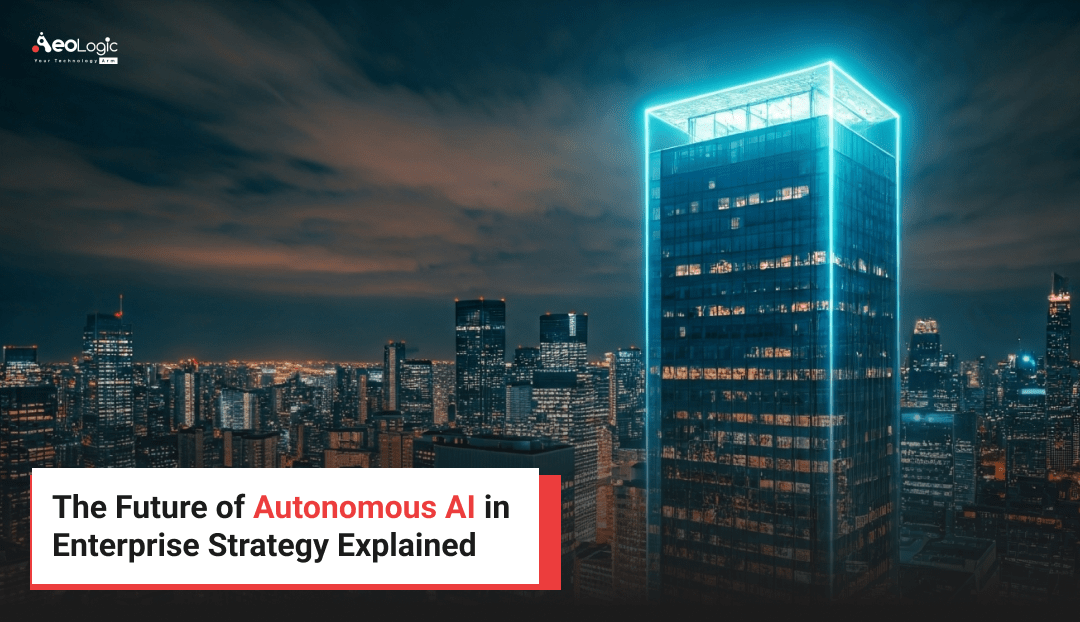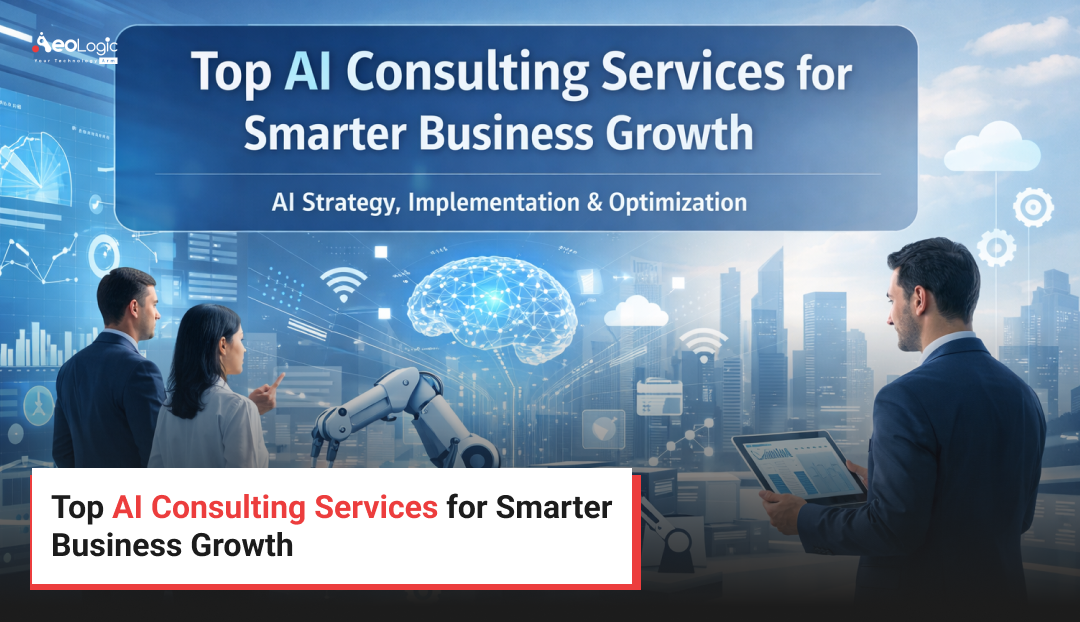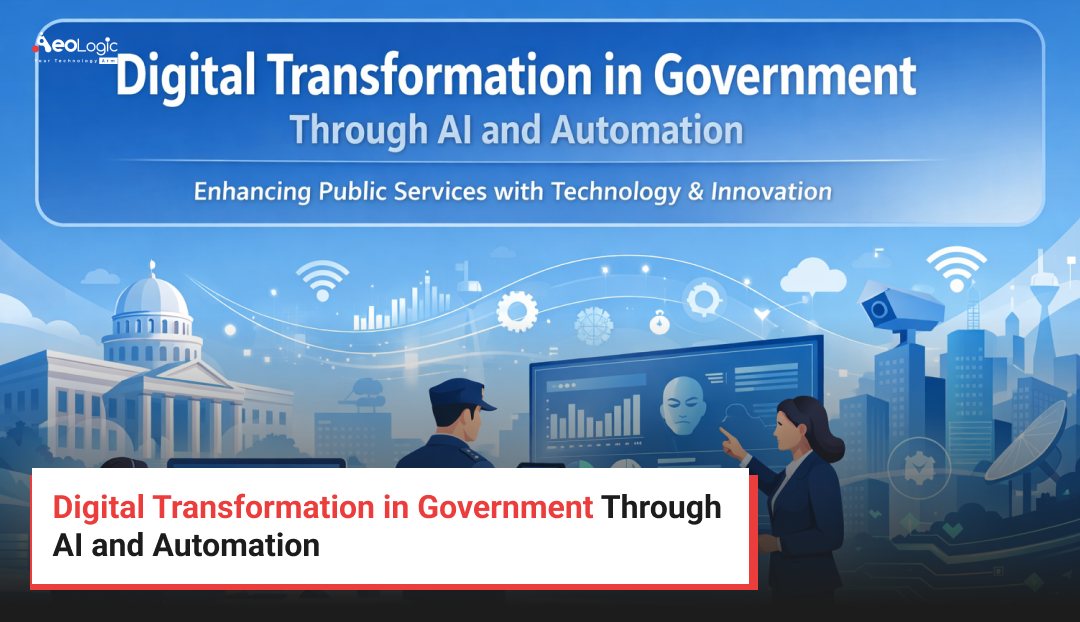Autonomous AI is now a big part of the way companies make plans for the future. It can do things by itself, learn from new information, and fix problems as they show up. A lot of people use artificial intelligence to deal with problems when they happen and to think of new ideas. This is not just about adding new technology to what you already have. It also changes how people plan, how they do their jobs, and how they reach business success. When you see how autonomous AI takes the lead, you can find out how to use it in your own business plans. This will help you stay ahead when new things come up.
Understanding Autonomous AI in the Enterprise Context
Autonomous AI in enterprise operations goes beyond just simple automation. It uses ai agents that work on their own without the need for human intervention. These ai agents learn and get better at what they do over time. With ai agents, companies can look at data, improve their business operations, and also create better customer experiences. This lets companies run their business operations more smoothly, and they get things done faster and with less effort.
To see what ai agents can really do, companies should look at how intelligent automation gives good ideas. When ai agents join in with the normal business operations, things change in a smooth way. This helps the work get better. It also makes it easy for people to use these new ai agents each day.
What Is Autonomous AI and How Does It Differ from Traditional AI?

Autonomous AI is a new type of artificial intelligence. It helps systems work on their own. These systems do not always need human intervention. Before, artificial intelligence worked with set programs. If changes were needed, people had to help. Now, autonomous AI can look at new information and change what it does by itself. It can make its own choices without someone telling it what to do.
Old or traditional AI often waits until people check its answers. But autonomous AI is different. It keeps learning on its own all the time. It can also learn from unstructured data. This means it can still get things done, even if there is no set plan or steps for what comes next.
This is a big difference. Traditional artificial intelligence helps as a tool. It often needs people to run it. Autonomous AI is not like that. It can make its own choices and work in business operations as a real partner. These artificial intelligence systems can do things by themselves. They are very good at finishing complex tasks. These systems help companies get their work done better, even when things change fast around them.
Key Characteristics of Autonomous AI Systems
Autonomous AI systems have features that make them stand out from other types of AI.
- Agentic AI Capabilities: These are systems that can act on their own. They take in feedback and use it to learn. They make small changes over time to get better and to give you the results you want.
- Intelligent Automation: These systems help with the work you do. There’s no need for as much manual work, so your job can get done faster. This can really help your operational efficiency.
- Complex Problem-Solving: ai agents take on hard jobs. They look over lots of data. With this, they help make good choices for you and your team.
- Collaborative Functionality: agentic ai works together by following steps that are already set up. This makes it easier for the whole group or company to keep things on track.
These systems help companies improve the way their enterprise operations work. They can help you grow your business and keep business continuity strong. When you use features like intelligent automation and agentic ai, you can get rid of things that slow you down. This lets you move to a faster and newer way to work. It helps your company get good results now and also be ready for new things in the future.
Examples of Autonomous AI in Today’s Enterprises
Autonomous AI is now changing the way people work in companies every day. This technology helps with things like customer service and predicting what could happen next. In the table below, you will see some of the main ways that autonomous AI can do this.
| Use Case | How Autonomous AI Helps |
| Customer Support Automation | AI agents work as smart customer service agents to answer questions fast. |
| Supply Chain Optimization | Autonomous systems use real-time data sources to help handle stock and deliveries. |
| Risk Analysis | Predictive models look at data to find risks, so people can make better choices. |
| Marketing Personalisation | Uses generative ai to make customer interactions personal by looking at their needs. |
All of these ways to use software robots show that autonomous AI can help fix gaps in the work. It can make things get done faster and bring in new ideas. This can make a company stronger. It can also help them do better than their competition.
Why Enterprises Are Embracing Autonomous AI

The use of autonomous AI is going up fast. A lot of people see that it can fix big problems and also make enterprise operations better. Many businesses now believe ai adoption helps them make decisions quicker. It can also help people do their work more easily and give customers better experiences.
When a business uses autonomous AI, it can do more work in less time. This helps when things get tough. It makes business continuity better and helps people and teams move faster. It also helps them get ready for change. Using autonomous AI is not just about adding new tools. It is about how the business thinks and works. This is how a business can have business success that lasts, even when things get hard in the world.
Business Drivers for Autonomous AI Adoption
Many things make companies want to use AI to help them do better at work:
- Enhanced Data Analysis: With AI, companies can look at a lot of data from many data sources. This helps them see patterns fast and make less mistakes in their work.
- Streamlined Operations: AI can do boring jobs for people. This lets your team focus on other work and helps make everything run better for more operational efficiency.
- Innovation and Agility: AI keeps a business up-to-date with the market. It helps them act fast when things change or when a new trend comes up.
- Customer-Centric Focus: AI makes customer experiences better through smart software. This helps people feel good, and they will want to keep using the company.
All these reasons explain why many businesses are going for ai adoption. They want to stay with what the market asks for and get better day by day. This helps the business to be more efficient inside, and also it makes the way they work with customers better. In the end, when a business uses AI, it can help them grow, even when times get tough.
Competitive Advantages of Early Implementation
Setting up autonomous AI systems early can help a business get ahead. This is something that other companies may not have yet.
If a company has a competitive advantage, it can use intelligent automation in its main business processes. This can help them get things done faster. The business will have more time to grow. When they use predictive tools and intelligent automation early, they can make sure to use all of their resources in the best way. This helps the company stay ahead of others.
Most people want business success. Today, to get this, you need to care for each customer. A personal touch is important. Now, advanced AI helps your business do this better. If your company uses these tools early, you can get ahead of others. This may set new ways that other businesses want to follow.
Using autonomous AI early will help a business stay strong when things change. It helps to set up the company so it can grow as time goes on. This is very important in the industries that need new ideas and want to keep their customers happy.
Common Enterprise Challenges Addressed by Autonomous AI
A lot of the biggest problems that companies face today can be solved by agentic AI systems. With agentic AI, people can get help to handle issues fast and in new ways. This kind of AI can do tasks on its own and make things work better for the business. More companies now want to use agentic AI because they see how it can make the work easier for everyone. In the future, agentic AI could help even more with all the different needs that companies have.
- Unstructured Data Problems: Autonomous AI can look at a large amount of unstructured data and sort it. This makes it easier for you to see clear answers. It helps you make good choices in less time.
- Customer Support Efficiency: If you have trained customer service agents, you can lower the wait time. This helps people get customer support faster and have a much smoother time with it.
- Business Continuity Planning: These systems can change quickly when things do not go right. They help your business keep working, even when there is an emergency.
Autonomous AI is not only there to fix issues that come up right now. It also helps you get ready for problems that might show up later. This means your business can be ready at all times. You can move fast, even if things around you change.
Businesses today have to deal with lots of unstructured data. This includes things like emails, chats, and support tickets. A lot of this data is important for customer support. But it can be hard for customer service agents when they need to read and use it right away. That is where agentic ai comes in.
Agentic ai can read unstructured data quickly. It helps the customer service agents get answers and give helpful replies to the people who need help. This makes the customer feel like they are heard right away. It also helps the team save time. One good thing is, this does not take away from business continuity. Agentic ai can work day and night, so your support team is always ready to help people, even when there are many customer support requests at one time.
When you use agentic ai, your business can give better customer support. You can take care of any problem at any hour. People get good service, and customer service agents can spend more time on hard problems that need a real person.
Integrating Autonomous AI into Enterprise Strategy

When you start to use AI in the company, it is about more than just adding something new. The main thing is to make sure the work with AI lines up with your business goals. A simple plan will help you see the link between your business goals and the changes from using AI. This way, it is easy for everyone to see and measure the results.
When you use autonomous AI systems, you get better at strategic planning. They let your company move faster and handle changes with ease. As your company gets bigger and goes forward, it is important to have these systems in place. They help new ideas keep coming and let your business stay ahead of others.
Aligning AI Initiatives with Business Goals
To get real benefits from autonomous AI, the goals of AI should match the big goals of the company. When there is a good match, people at the company can get more from the work that the AI does. This is the best way for the company to use AI and get the most out of it.
Every company needs to set clear business goals. These goals help find where AI can help the most. It could be in daily tasks or making customer experiences better. A good strategic approach is key. With this, a company can pick the right projects. So, AI can go after what the team needs and help people work together well.
When this link is strong, autonomous AI is not just a tool. It can help bring real and clear changes in enterprise operations. By making sure AI’s new ideas follow the business path, companies can do more work. This helps them grow well and be ready for what comes next.
Building a Cross-Functional AI Leadership Team
The success of enterprise AI is shaped by strong leaders. These leaders need to have good tech skills. They should also know how business works. You have to get both the tech side and the business side. A good leader will use both to help the team do well. This will also help move the company ahead.
- Involve Different Departments: Bring people in from the different departments. Make sure the work and skills that each group has get added to your AI plans.
- Foster Collaboration: Get IT, top leaders, and team managers to work together as one group. This helps everyone be on the same page and will make the work go better.
- Address Skills Gaps: Train your teams so they stay current, and also add new team members who can solve the main problems without any trouble.
- Implement Defined Roles: Give every person a clear job to do with AI initiatives and the systems that go with them.
When a company has leaders for each team, their AI can get more done. This makes sure that even big companies, in many areas, see good results from using AI.
Change Management and Employee Buy-In
Making sure that your AI projects work well means you need good change management. The way you handle changes in your team or your company can help these projects hit their goals. When you use the right way to manage change, people feel ready for the new things that AI brings to them. This makes it easier to get everyone to use the new systems at work. If you want your AI projects to be a big success, it is important to use the right steps to manage change.
When you do technology transformation the right way, your staff feel happy and all feel like one team. If you let everyone know early and often about what AI can do, the trust in the team gets better. When you ask for ideas from your staff, it brings the people together. This lets everyone work as a group to solve problems.
As things change, it is important to keep training people. You should also ask them for feedback. This helps get employee buy-in. It makes sure everyone in the company goes in the right way.
When everyone in the group knows what is going on, people start to trust the AI systems. These new systems will change the way they work for good.
Core Components of an Autonomous AI-Driven Enterprise

Companies that use autonomous AI systems rely on intelligent automation and tools that work right away. A strong data infrastructure is important for these companies. It helps support their autonomous solutions in the best way. When you have a good data infrastructure, your team can get insights fast, even if the data comes in small pieces.
When these AI systems join together, they help enterprise operations in many ways. They can give good advice or you can have customer service agents that do their work on their own. With their help, work gets smoother and tech tools become easy to use. This lets companies grow fast. They can also change old and hard tasks into simple digital jobs in the best way.
Data Infrastructure and Real-Time Analytics
A strong data infrastructure is very important for real-time analytics. It helps companies use both unstructured and structured data in a better way. By using intelligent automation and predictive models, people can turn historical data into useful insights. These insights can help the company reach its business goals. This type of setup also makes it easier for different departments to work well together. It lets everyone make more data-driven decisions.
When companies look at market data in real-time, they get a competitive advantage. It gives them a better chance at business success. Companies can meet new customer needs and react fast when market changes happen by using data infrastructure the right way.
Decision-Making Automation and Augmentation
The way businesses work is changing. Many companies now use machine learning and natural language processing to handle large amounts of unstructured data. This helps leaders have predictive models. With these models, they make better choices for strategic planning. AI agents have a vital role in this change. They deal with complex tasks, so things get done faster. This helps the business work better and more smoothly.
Intelligent automation takes away the need for a lot of human intervention. This lets people spend their time on what is most important. When the company uses this, those who make decisions get real-time insights. This helps the company be more quick and stay ahead of others in the field. If a business uses intelligent automation in different departments, it will see better results. This helps the whole company work better and have stronger outcomes.
Hyper-Personalization and Customer Experience Transformation
Hyper-personalization is now shifting how companies work with customers. The use of machine learning and natural language processing makes this possible. Companies get vast amounts of data from many sources. They use all this data to make every experience feel special to each person. This helps them reach people based on their own habits and what they like.
AI agents have a vital role in customer support. They help by taking care of simple jobs for people, and they answer questions fast. Their smart, intelligent automation makes people feel closer to the companies they deal with. This helps customers feel happy. A business with this kind of help can have a good competitive advantage over others.
As companies create their business plans, the effect of hyper-personalization will keep shaping how enterprise operations work. The way people use customer experiences today will help decide what comes next.
Implementation Roadmap for Autonomous AI
A clear step-by-step plan is needed to bring autonomous AI into enterprise operations. The first thing you should do is see if different departments are ready for the change. After that, look for use cases that match the business goals of your company. It is a good idea to start with test projects. These projects can help you see how the AI works and what it can do before you use it in other parts of your business. By keeping track of the return on investment, your company can find ways to get better at operational efficiency and make things run smoother over time. A strategic approach helps you keep business continuity and lets your company get the full potential of AI technology.
Assessing Readiness and Identifying Use Cases
It is important to look at how the company is set up when you think about ai adoption. First, people in the company have to check if their data infrastructure can handle unstructured data and large datasets. Then, you should look for clear use cases. A good way to do this is to find those parts in business processes where intelligent automation can help. This will make work faster and better. For example, people can use ai to help with complex tasks or to support customer service agents. This is one way to use ai in the business.
Having good strategic planning and knowing about machine learning and predictive models can really help a company. This can make sure that ai adoption matches with the main business goals. When a company uses AI in the right way, it can get more value from AI projects and improve operational efficiency.
Pilot Projects and Scaling AI Solutions
Pilot projects let companies see how well autonomous AI can work in their own enterprise operations. These projects are a safe way to test AI before using it fully. People can find out if AI can take care of complex tasks inside the company. This can help everyone make better decisions based on data if they want to go bigger with ai adoption later. A company should pick pilot projects that line up with its own goals. This helps them focus on use cases that really matter to them. It is also a good way to get better at operational efficiency.
To help ai agents do well in more places, companies need to have strong data infrastructure. They should also get feedback a lot. This will help them use more unstructured data. It will also help their ai agents do better in different departments.
Measuring ROI and Iterative Improvement
To see the return on investment (ROI) when you use autonomous AI in your business, you need to do a few things. First, check how the AI can help you finish complex tasks faster and in a better way. Look at how it helps with making choices and makes your customers’ experiences better. Keep making your AI better over time, because this is important for the long run. You can use machine learning so your AI gets better each year. Use data analysis to make feedback loops. This will let you update your plans often and help software robots work better.
When you do all of these steps, your team can change to meet new business goals and what the market wants. This makes sure your AI always gives you the best help it can.
Risks, Ethics, and Governance in Autonomous AI

Dealing with the world of autonomous AI means we need to think about risks, ethics, and how it is run. It is important for organizations to set clear rules about what is right and wrong. This helps when they use intelligent automation and predictive models. These rules are there to make sure work lines up with business goals. At the same time, you have to keep security in mind. It is key to protect data privacy, especially when the system uses sensitive information.
You need to be open about how the AI works. Try to make it less biased, too. If you do this, people will feel better about using it. They will trust the system more. Business leaders should use a strategic approach when working with AI. This way, they get the most out of it, and keep their enterprise operations safe.
Ethical Frameworks for Responsible AI Deployment
Making strong ethical guidelines is key to make sure AI is used the right way in a business. A company should set clear rules for data governance. The company needs to handle all sensitive data with care. It must also keep to privacy rules all the time. When AI is part of business operations, a business has to think about ethical considerations with every new step. A business must try to make it easy for people to know how AI really works. When a company brings these ethical considerations into its strategic planning, it can get a good competitive advantage. This can help lower risks like bias or treating people in unfair ways. These steps help a business build trust and they make it easier for new technology to match the main values of the business.
Managing Security, Privacy, and Regulatory Compliance
It is important to have strong systems for security and privacy when you use autonomous AI in your enterprise operations. This matters a lot if you work with sensitive data. You need to make sure that you follow all the rules and laws made for this kind of information. Your group should put good data governance plans in place. This will help you deal with any risk that can come up when working with unstructured data. It also helps keep customer trust.
By using machine learning and predictive models, companies can spot problems early. This helps them get better at risk management. When a company takes time to plan and follow the right steps, it can make sure its AI work matches ethical considerations and the law. Doing this helps people feel good about using AI at work, and it also builds trust.
Mitigating Bias and Ensuring Transparency
Addressing bias in autonomous AI systems is important if we want things to be fair and open for all. When you use strong algorithms and put data governance first, the whole process is clearer. Using more data sources along with good data analysis makes it easier to spot and fix bias in unstructured data. This way, predictive models will get better as time goes on.
When businesses follow ethical frameworks, they earn trust from people who care about what the company does and want AI to be used the right way. Focus on transparency is good for ethical considerations. It also helps with business success, because fair AI choices support the company’s goals and what it stands for.
The Future Outlook: Trends Shaping Autonomous AI in Enterprises
New technology is changing the way companies use AI agents in the work they do. It helps many businesses to get better at the things they do every day. There is now an increase in operational efficiency, and companies get more creative too. With the help of machine learning and natural language processing, these AI agents can do complex tasks in many areas. This move to intelligent automation helps make business processes better and smoother. It also helps give customers personal services and better customer experiences.
Right now, people and AI work together in ways we did not see before. Teams now have more time to do strategic planning because the AI agents handle data analysis. Because of this, companies use data-driven ways to work, and they can respond faster to each new development. This lets them get the most from AI, with better business processes and great customer experiences.
Emerging Technologies Enhancing Autonomy
Using advanced technologies is changing the way enterprise operations work. For example, machine learning and natural language processing let AI agents look at a lot of unstructured data. This makes it easier for people to find good info and make smart choices. People can also use predictive analytics. With robotic process automation, it is possible to do complex tasks faster and better. This helps boost operational efficiency in different departments.
Generative ai brings new ideas to life and makes customer experiences feel personal. This is important for any company that wants to get a competitive advantage. As the use of generative ai tools grows, they have a vital role in strategic planning. These tools help shape business success. They also help change how the future of work looks.
Human-AI Collaboration in Next-Gen Workforces
The way people work with ai agents is changing offices for the future. Teams that use things like machine learning and natural language processing can do more work. These are examples of intelligent automation. They can handle complex tasks better, too. Working together like this helps people make better choices. It also brings new ideas and better ways to solve problems.
When business leaders start to use AI in their companies, they often have to handle a lot of unstructured data. This can help with both strategic planning and improving operational efficiency. When people work with AI, companies can move faster. They also can change quickly and be ready for what the market will want next.
Predictions for the Next Decade in US Enterprises
Autonomous AI will change the way businesses work in the next ten years. With better machine learning, it will be much easier to use predictive models that give more correct results. The companies will use both old and new data to make good choices. With ai agents, people at their jobs will see them take care of many complex tasks. This can help all teams get better at doing their work. It will also help companies make customer experiences better for everyone. As a result, operational efficiency will grow and people will feel the difference in how the company works.
Natural language processing will help people and ai work better as a team. It will make it easier to see that strategic planning fits changing business goals. When more companies add intelligent automation to what they do, the ones with strong ai adoption will get a good competitive advantage. This will change the future of work for all of us.
Conclusion
Autonomous AI is making big changes in the way people use business strategy. This new technology can help a company in the way it does work every day. It can also help for better customer experiences and better business results. When a company moves to ai adoption, it must have a good plan. At this time, companies need to think about doing things the right way.
By using machine learning, data governance, and intelligent automation, businesses can take on complex tasks in a better way. These tools help people in the company fill their skills gaps. If you focus on these steps, you can use the full potential of AI in your work. This is what can keep any company ahead when things change. A business that works like this often has good operational efficiency. Over the years, they also get better results.
Frequently Asked Questions
How does autonomous AI improve enterprise decision-making?
Autonomous AI helps companies by using real-time data analysis. It looks at what is going on right now. This gives fast insights, which can help people make smart choices just when they need to. With this technology, it can handle simple tasks by itself. This gives leaders more time to think about business plans. The company can answer changes fast, so people in it can make good choices even when the market changes quickly.
What industries benefit most from autonomous AI adoption?
Industries like healthcare, finance, retail, and manufacturing get many benefits from ai adoption. These groups use ai adoption to work faster and make things easier. With the help of AI, they can spot trends and use those details to plan for what is next. It helps them give better and more personal customer experiences. The people working in these areas can do their jobs in a better way with ai adoption. This opens the door for new ideas, helps their business grow, and gives good support for everyday choices and big plans in the future.
What are the main risks of autonomous AI for businesses?
The biggest risks of using autonomous AI in business are problems with data privacy, the AI making unfair choices, and following the law. If you use AI too much, people may stop paying attention and not make their own choices. You need to watch out for these issues so you can use AI in a safe and good way. This helps your business work well and stay on track.
How can companies ensure ethical use of autonomous AI?
Companies have to use autonomous AI in the right way. They need to set strong rules for what is right and what is wrong. It is good to be open about the way they use AI when making decisions. Keeping data safe and private must be a top priority for them.
They need to check the systems often. It is a good idea to teach workers the right way to use AI. This helps people feel more responsible about what they do, and it can also stop problems like bias or the wrong use of AI.
What skills are essential for managing autonomous AI in the enterprise?
To work well with autonomous AI, it is important to understand data analysis. You also need to know how AI algorithms work. Good project management skills will help you organize your tasks and people. You should also be able to talk with your team in a clear way. On top of that, you have to be aware of ethical considerations and any rules for using AI. This makes sure that your work is safe, fair, and fits the company’s goals.






